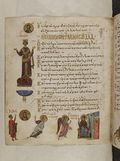I test-drive Google Latin -- and some other new electronics
Our computer officer (thanks Steve) alerted me to the new addition to Googles repertoire of electronic translation aids: the Latin translator. You type the Latin words in they give you the English words out.
Wondering whether it might put me out of a job (no, not seriously..), I decided to give it a test drive.
Let me say, before I get the knives out, that part of me is full of admiration for the people who do this. I would have no idea how to start making a computer translating programme. I'm sure it's very hard -- and that many exciting innovations have teething troubles.
But with that out of the way, the verdict is -- dont touch it with a barge pole.
My first shot was actually quite encouraging. I typed in "arma virumque cano" and "I sing of arms and the man" came out. I have come to suspect that someone had actually specially entered a range of obvious quotes people might search for, with a correct translation -- because Google was unexpectedly good at these ("per ardua ad astra" = "up the steep slope to the stars" etc). Now that may be useful enough in its was, but it isnt what I call "translation"; it's a database of quotes.
Things started to go wrong pretty quickly when I typed in some baby Latin. "Servus est in villa" (and you couldnt get much simpler than that) comes out as "In the town is the servant of" (how come villa = town? and where has the "of" appeared from?).
More complicated bits of Latin literature fared just as badly (if they hadnt been entered as a "quote", there was not a hope). Try the start of Tacitus' Annals:
"urbem romam a principio reges habuere; libertatem et consulatum L Brutus instituit"
That emerges as:
"the city of Rome from the beginning they had been the kings of the liberty of the consulship, and instituted the Brutus, 50"
What do these people have with "of"? And even if you change L to Lucius, you still get:
"the city of Rome from the beginning they had been the kings of the liberty of the consulship, and instituted the base of Lucius Brutus"
Where has base appeared from? And why is he now in the genitive?
My final attempt was with the start of Horace Odes 1, 7 (the Plancus Ode-- which Peter, Llewelyn and I will be discussing in Cheltenham at the Literary Festival next week):
"Laudabunt alii claram Rhodon aut Mytilenen
aut Ephesum bimarisue Corinthi
moenia. . . "
This came out as:
"Others sing in praise of Rhodes, or a clear to Mitylene
bimarisue to Ephesus, or Corinth,
the walls of . . "
So they dont know the future tense either....laudabunt??
To be fair, the site does give you the chance of contributing a better translation. So if enough Latinate mugs do so, the database might get big enough to be more helpful. But until they have taught this computer so basic Latin grammar, it will be an uphill struggle.
Rather more useful (though I am not absolutely sure for what) is Google maps, street view of Pompeii. 
But for the real Rolls Royce of IT (and without doubt a real service to scholarship), go to the British Library's website, where they have put almost 300 of their Greek manuscripts on-line. with full bibliography and description -- and you can zoom in and really look closely at the text, all for free. The project was funded by the Niarchos foundation, to whom we should be truly grateful. You can find an overview here, with a well-deserved puff from me.
Mary Beard's Blog
- Mary Beard's profile
- 4110 followers




